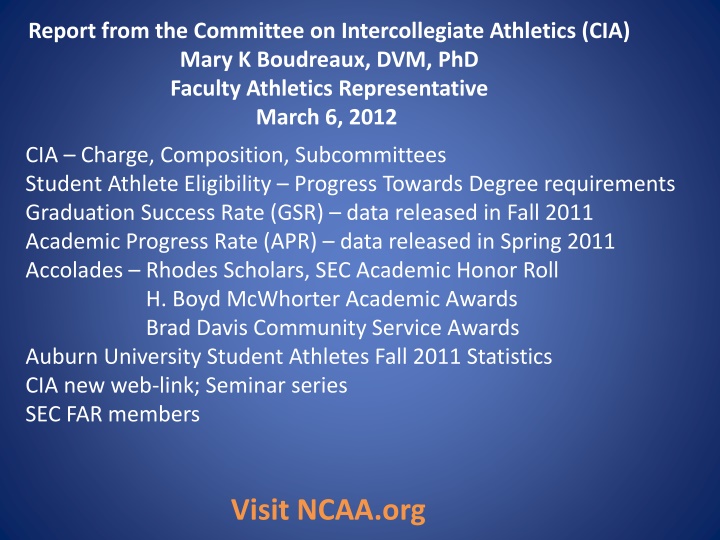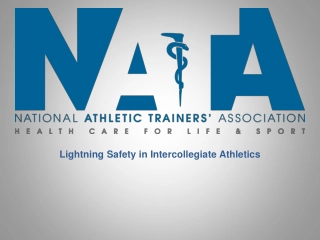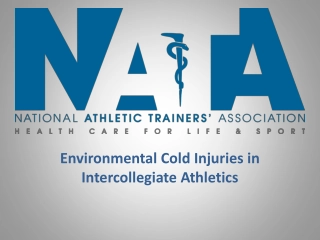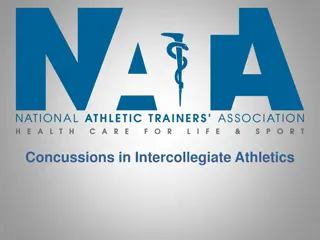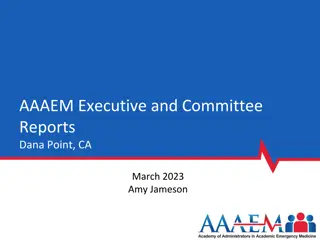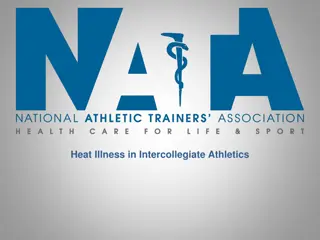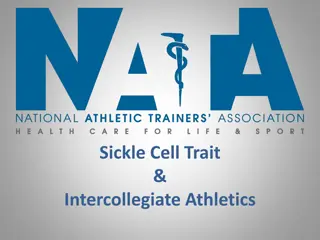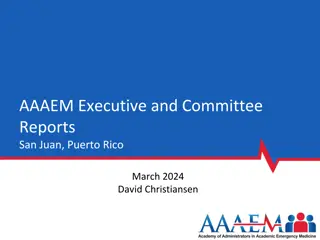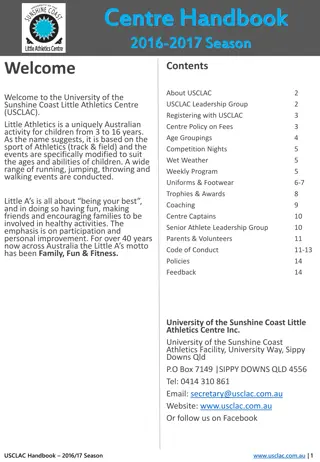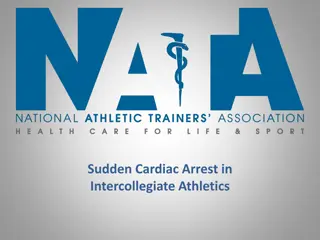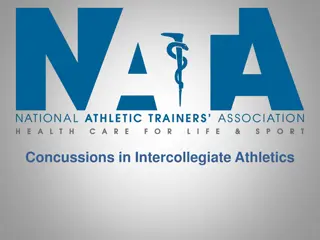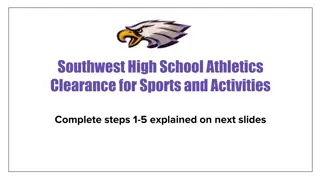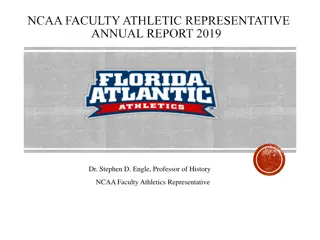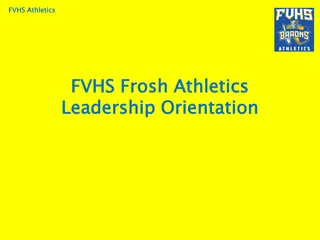Summary of Committee on Intercollegiate Athletics - March 6, 2012
This report highlights the activities of the Committee on Intercollegiate Athletics (CIA) at Auburn University, covering student athlete eligibility, academic progress rates, and accolades received by athletes. The committee's charge, composition, subcommittees, and key members are outlined, emphasizing their roles in overseeing the university's athletics program for compliance with NCAA and SEC regulations.
Download Presentation

Please find below an Image/Link to download the presentation.
The content on the website is provided AS IS for your information and personal use only. It may not be sold, licensed, or shared on other websites without obtaining consent from the author.If you encounter any issues during the download, it is possible that the publisher has removed the file from their server.
You are allowed to download the files provided on this website for personal or commercial use, subject to the condition that they are used lawfully. All files are the property of their respective owners.
The content on the website is provided AS IS for your information and personal use only. It may not be sold, licensed, or shared on other websites without obtaining consent from the author.
E N D
Presentation Transcript
Report from the Committee on Intercollegiate Athletics (CIA) Mary K Boudreaux, DVM, PhD Faculty Athletics Representative March 6, 2012 CIA Charge, Composition, Subcommittees Student Athlete Eligibility Progress Towards Degree requirements Graduation Success Rate (GSR) data released in Fall 2011 Academic Progress Rate (APR) data released in Spring 2011 Accolades Rhodes Scholars, SEC Academic Honor Roll H. Boyd McWhorter Academic Awards Brad Davis Community Service Awards Auburn University Student Athletes Fall 2011 Statistics CIA new web-link; Seminar series SEC FAR members Visit NCAA.org
Charge of the Committee on Intercollegiate Athletics The Committee on Intercollegiate Athletics shall: (1) recommend to the President the policies for the operation of the Intercollegiate Athletics program at Auburn University, (2) monitor for the President all aspects of the Intercollegiate Athletics Program at Auburn University for compliance with University policies, and with NCAA and SEC legislation. (3) assist the President and the Director of Athletics on any aspect of the Intercollegiate Athletics Program for which advice or assistance is requested. The Committee on Intercollegiate Athletics shall meet once per quarter and additionally as called by the President of Auburn University.
Composition of the Committee on Intercollegiate Athletics Mary K Boudreaux, Pathobiology, Chair Larry Teeter, Forestry & Wildlife Sciences John Carvalho, Communication and Journalism John Saye, Curriculum & Teaching Joseph Molnar, Agricultural Economics and Rural Sociology Barbara Wilder, Nursing James Barbaree, Biological Sciences Don Large, Executive Vice-President Ainsley Carry, Vice President of Student Affairs C. Wayne Alderman, Dean of Enrollment Management Kevin Robinson, Executive Director of Internal Auditing Seth Humphrey, A & P Chair and Representative Nakeisha Janigan, Staff Council Chair and Representative Kirby Turnage, SGA President, Student Representative Ex-Officio Members Jay Gogue, President Timothy Boosinger and Constance Relihan, Office of the Provost Jay Jacobs, Athletics Director Rich McGlynn, Senior Associate Athletics Director
Subcommittees of the Committee on Intercollegiate Athletics Academic Standards Subcommittee Joseph Molnar, Chair Awards Subcommittee John Carvalho, Chair Compliance Subcommittee Mary K Boudreaux, Chair Drug Education/Testing Advisory Group Randall Clark, Chair Equity, Welfare, and Sportsmanship Barbara Wilder, Chair Priority and Seating Subcommittee John Saye, Chair Athletics Department Seminar Series Barbara Struempler, Chair
Student Athlete Eligibility The Division I academic-eligibility model provides a set of standards that begin when a high school student is considering becoming a Division I student-athlete and end when the student-athlete earns a degree from a Division I institution. Before a high school student can be eligible to play Division I sports, he or she must meet academic requirements in high school. Those standards include: The successful completion of 16 core courses. A sliding-scale combination of grades in high school core courses and standardized-test scores. Example, if a student-athlete earns a 3.0 grade-point average in core courses, that individual must score at least 620 on the SAT or 52 on the ACT. As the GPA increases, the required test score decreases, and vice versa. From NCAA.org
Core GPA SAT Sum ACT Core GPA SAT Sum ACT 610 51 620 52 630 52 640 53 650 53 660 54 670 55 680 56 690 56 700 57 710 58 720 59 730 59 730 60 740-750 61 760 62 770 63 780 64 790 65 800 66 810 67 820 68 3.550 & above 400 37 3.525 3.500 3.475 3.450 3.425 3.400 3.375 3.350 3.325 3.300 3.275 3.250 3.225 3.200 3.175 3.150 3.125 3.100 3.075 3.050 3.025 3.000 2.975 2.950 2.925 2.900 2.875 2.850 2.825 2.800 2.775 2.750 2.725 2.700 2.675 2.650 2.625 2.600 2.575 2.550 2.525 2.500 410 420 430 440 450 460 470 480 490 500 510 520 530 540 550 560 570 580 590 600 38 39 40 41 41 42 42 43 44 44 45 46 46 47 47 48 49 49 50 50
NCAA Post-Presidential Retreat Updates Committee on Academic Performance (CAP) Chair: Walter Harrison, President, University of Hartford Vice Chair: Roderick McDavis, President, Ohio University Recent proposed changes Effective Date August 1, 2015 Initial eligibility minimum of 2.3 GPA (from 2.0) Increased sliding scale require higher GPA (approx. 0.5 units) for a given test score. Require prospects to complete 10 of the total 16 required core courses before the start of their senior year. 7 of the 10 must be in English, math, and science.
Student Athlete Eligibility continued 40-60-80 Rule. Once in college, student-athletes must make steady progress toward degrees. Student-athletes must complete coursework required for a degree in the following time frame: 40 percent by the end of their second year, 60 percent by the end of their third year, 80 percent by the end of their fourth year. Student-athletes are allowed five years to graduate while receiving athletically related financial aid. All student-athletes must earn a minimum of six hours each term to be eligible the next semester. From NCAA.org
Graduation Success Rate (GSR) The NCAA developed the Division I Graduation Success Rate in response to college and university presidents who wanted graduation data that more accurately reflect the mobility among all college students today. The rate measures graduation rates at Division I institutions and includes student-athletes transferring into the institutions. It differs from the rate mandated by the federal government, which does not count incoming transfer student-athletes and counts student-athletes who transfer out as not having graduated, regardless of whether they actually did. The Graduation Success Rate also allows institutions to exclude from the computation student-athletes who leave their institutions before graduation, so long as they would have been academically eligible to compete had they remained. From NCAA.org
Federal Graduation Rate (FGR) vs. Graduation Success Rate (GSR) FGR assesses only first-time full-time freshmen in a given cohort and only counts them as academic successes if they graduate from their institution of initial enrollment within a six-year period. It makes no accommodation for transfers into or out of an institution. The rate is very limited because it ignores the large number of transfer students in higher education, but it is still the only rate that allows a direct comparison between student-athletes and the general student body. GSR begins with the federal cohort, and adds transfer students, mid-year enrollees, and non-scholarship students (in specified cases) to the sample. Student-athletes who leave an institution while in good academic standing before exhausting athletics eligibility are removed from the cohort of their initial institution. This rate provides a more complete and accurate look at actual student-athlete success by taking into account the full variety of participants in Division I athletics and tracking their academic outcomes. From NCAA.org
Comparison of Graduation-Success Rates and Federal Graduation-Rate Cohorts (2001-2004 Entering Classes) Enrolled (Under Federal Definition) Enrolled as Frosh in January Two-Year College Transfers Four-Year College Transfers Non-Scholarship Athletes (Only at Schools Not Offering Aid) Total Enrolled Allowable Exclusions (Death, Military, Church Mission, etc.) Left Eligible Total Denominator Federal Rate 76,536 0 0 0 GSR 76,536 2,190 9,278 7,927 0 76,536 8,882 104,813 (+36.9%) 261 357 0 19,339 76,275 85,117 (+11.6%) Both the GSR and FR evaluate a six-year graduation rate (% of students graduating by end of their sixth year or before the 7th Fall) From NCAA.org
1999 2000 2002 2003 0.78 2000 2001 2003 2004 1998 1999 2001 2002 0.77 2001 2002 2004 2005 0.76 1997 1998 2000 2001 0.75 0.74 1996 1997 1999 2000 0.73 1995 1996 1998 1999 0.72 0.71 0.7 0.69 2005 0.72 2006 0.74 2007 0.75 2008 0.77 2009 0.78 2010 0.77 2011 0.76 GSR Men s Tennis = 100% Football = 63% Soccer = 91% Men s Track = 86% M & W Swimming = 81/88% Softball = 87% Women s Golf = 100% Gymnastics = 91% Women s Basketball = 83%
2011 Average GSR Rate of Last 4 Cohorts SEC and Division I Student-Athletes 100 92 90 83 82 80 79 79 78 77 77 76 76 80 73 72 70 60 50 % 40 30 20 10 0 DIV I UF UA VAN MSU AU UM UT UGA USC UK LSU ARK
Graduation Success Rate by Sport 2001 2004 cohorts (n = 319) Men s Sports GSR FR Baseball 67 25 Basketball 83 42 Basketball 29 11 C/C Track 73 67 CC/Track 86 79 Equestrian 80 75 Football 63 50 Golf 100 100 Golf 50 67 Gymnastics 91 64 Swimming 81 76 Soccer 91 82 Tennis 100 50 Softball 87 69 Volleyball 77 Women s Sports GSR FR Swimming 88 Tennis 83 75 67 47 Graduation Rates All Students (%) 2001 2004/5 cohorts (FED Rate) Division I (n = 2,809,504) Auburn (n = 15,157) AU Student Athletes (n = 307) Men 60 Men 62 Women 65 Women 68 Combined 62 Combined 65 Men Women 68 Combined 60 53
Student Athletes Graduation Rates (GSR %) 2001 2004/5 cohorts Division I (n = 85,117) Men Women Combined Auburn (n = 319) Men Women Combined 73 88 80 69 85 76
Academic Progress Rate (APR) While eligibility requirements make the individual student-athlete accountable, the Academic Progress Rate (APR) creates a level of institutional responsibility. The Academic Progress Rate is a Division I metric developed to track the academic achievement of teams each academic term. Each student-athlete receiving athletically related financial aid earns one retention point for staying in school and one eligibility point for being academically eligible. A team s total points are divided by points possible and then multiplied by one thousand to equal the team s APR. From NCAA.org
Academic Progress Rate Calculation Example A Division I Football Bowl Subdivision team awards the full complement of 85 grants-in-aid. If 80 student-athletes remain in school and academically eligible, 3 remain in school but are academically ineligible and 2 drop out academically ineligible, the team earns 163 of 170 possible points for that term. Divide 163 by 170 and multiply by 1,000 - team s APR that term is 959. The NCAA calculates the rate as a rolling, four-year figure that takes into account all the points student-athletes could earn for remaining in school and academically eligible during that period. Teams that do not earn an APR above specific benchmarks face penalties ranging from scholarship reductions to more severe sanctions. Teams that score below 925 and have a student-athlete who both failed academically and left school (0 for 2) can lose scholarships (up to 10 percent of their scholarships each year) under the immediate (contemporaneous) penalty structure. From NCAA.org
Teams with Academic Progress Rates below 900 face additional sanctions, increasing in severity for each consecutive year the team fails to meet the standard. Year 1: a public warning letter for poor performance Year 2: restrictions on scholarships and practice time Year 3: loss of postseason competition for the team (such as a bowl game or the men s basketball tournament) Year 4: restricted membership status for an institution. The school s entire athletics program is penalized and will not be considered a part of Division I THE MINIMUM APR HAS RECENTLY CHANGED FROM 900 TO 930 From NCAA.org
NCAA Post-Presidential Retreat Updates Committee on Academic Performance (CAP) Proposed Penalty Structure for APR of less than 930 Level 1 Practice penalties (4 hours/day/week of practice in season resulting in 16 hours per week rather than 20 and 5 days per week rather than 6, to be replaced with academic activities. Level 2 Adds out of season practice restrictions (4 hours per week), cancellation of nontraditional season or spring football and for sports without a nontraditional season, a 10% reduction in contests and length of season. Level 3 Menu of options including financial penalties, restricted NCAA membership, coaching suspensions for a designated number of contests and/or recruiting, restricted access to practice for incoming student-athletes that fall below predetermined academic standards and multi-year postseason competition bans. Teams will be subject to Level 3 penalties until APR improves.
Minimum APR changed from 925 to 930 for Division I postseason competition Postseason Competition Year Multiyear APR for for Postseason Eligibility Two most recent years average APR for Postseason Eligibility 2011 2012 Current Penalty Structure applies NA 2012 2013 Four year APR of 900 OR Two most recent years average at or above 930 2013 2014 Four year APR of 900 OR Two most recent years average at or above 930 2014 2015 Four year APR of 930 OR Two most recent years average at or above 940 2015 2016 and beyond Four year APR of 930 NA
Sport Baseball Football Men's Basketball Men's Cross Country Men's Golf Men's Swimming Men's Tennis Men's Track, Indoor Men's Track, Outdoor Softball Women's Basketball Women's Cross Country Women's Golf Women's Gymnastics Women's Soccer Women's Swimming Women's Tennis Women's Track, Indoor Women's Track, Outdoor Women's Volleyball APR Multi-Year (4 year) Rate Posted Spring 2011 940 940 934 933 958 927 965 948 948 976 1000 NCAA Public Recognition Award (top 10%) 990 983 979 987 963 986 943 941 952 From NCAA.org
Accolades Rhodes Scholars In 2009 Jordan Anderson, the men s swimming and diving captain, was awarded a Rhodes Scholarship. In 2010 Erica Meissner, the women s swimming and diving team captain, and gymnast Krissy Voss were Rhodes Scholar finalists. In 2011 Dan Mazzaferro, the men s swimming and diving captain, was a Rhodes Scholar finalist. Auburn is the only SEC institution to have 4 student-athletes as finalists in the last 5 years. From NCAA.org
Criteria for SEC Academic Honor Roll (1) A student-athlete must have a grade point average of 3.00 or above for either the preceding academic year (two semesters or three quarters) or have a cumulative grade point average of 3.00 or above at the nominating institution. (2) If a student-athlete attends summer school, his/her grade point average during the summer academic term must be included in the calculation used to determine eligibility for the Academic Honor Roll. (3) Student-athletes eligible for the Honor Roll include those receiving an athletics scholarship, recipients of an athletics award (i.e., letter winner), and non-scholarship student-athletes who have been on a varsity team for two seasons. (4) Prior to being nominated, a student-athlete must have successfully completed 24 semester or 36 quarter hours of non-remedial academic credit toward a baccalaureate degree at the nominating institution. (5) The student-athlete must have been a member of a varsity team for the sport s entire NCAA Championship segment.
2011 SPRING SEC ACADEMIC HONOR ROLL Based on grades from the 2010 Summer and Fall terms and 2011 Spring term. Brooks Beisner Zach Blatt Caleb Bowen Justin Hargett Jon Luke Jacobs Cory Luckie Chris O Neil Kevin Patterson Patrick Savage Mitchell Self Derek Varnadore Anna Becker Coryn Bergenty Mallory Campbell Rachel Cooper Casey Fowler Jillian Fuller Kelsey George Dorothy Grubb Kristin Hansen Lydia Hinshaw Baseball Baseball Baseball Baseball Baseball Baseball Baseball Baseball Baseball Baseball Baseball Equestrian Equestrian Equestrian Equestrian Equestrian Equestrian Equestrian Equestrian Equestrian Equestrian History Physical Ed/ Teach Ed Health Promotion Exercise Science Finance Biomedical Sciences/Pre-Med Accountancy Economics Pre-Building Science Pre-Building Science Pre-Building Science Marketing Psychology Animal Science/Pre-Vet History Finance Health Promotion Fish & Allied Aquacultures English Psychology Elementary Education
2011 Spring SEC ACADEMIC HONOR ROLL - continued Jessica Jones Bailey Kleis Mallory Kolpin Alexandra Loprete Margaret McAlary Paige Monfroe Christine Orrison Lindsay Portela Jessica Remy Leslie Roper Anna Schierholz Rosson Anderson Blayne Barber Dominic Bozzelli Cory Gilmer Michael Hebert Kyle Kopsick Mark McCurdy John Stembridge William David Zickler Madison Overbey Patricia Sanz Equestrian Equestrian Equestrian Equestrian Equestrian Equestrian Equestrian Equestrian Equestrian Equestrian Equestrian M. Golf M. Golf M. Golf M. Golf M. Golf M. Golf M. Golf M. Golf M. Golf W. Golf W. Golf Lab Technology Animal Science/Pre-Vet Human Development & Family Studies English Communication Biomedical Sciences/Pre-Med Chemistry Biochemistry Communication Exercise Science Finance Journalism Business Administration Finance Public Administration Business Administration Public Administration History Radio, TV, & Film (Mass Communication) Mechanical Engineering Finance Marketing Biomedical Science/Pre-Med
2011 Spring SEC ACADEMIC HONOR ROLL - continued Katie Colton Elizabeth Eisterhold Amber Harrison Elaine Loree Holly Ragsdale Baylee Stephens Liana Wuchte Tim Puetz Alex Stamchev Davis Taylor Michael Wardell Fani Chifchieva Dunja Djuranovic Jil Hastenrath Myrthe Molenveld Paulina Schippers Caroline Thornton Gerard Brown Zachary Clayton John Cowden Neil Danville Milan Dekich Softball Softball Softball Softball Softball Softball Softball M. Tennis M. Tennis M. Tennis M. Tennis W. Tennis W. Tennis W. Tennis W. Tennis W. Tennis W. Tennis M. Track M. Track M. Track M. Track M. Track Marketing Marketing Industrial & Systems Engineering Accountancy Accountancy Pre-Nursing Pre-Biosystems Engineering Economics Economics Economics Undeclared Science & Math/Pre-Med School Counseling Horticulture Landscape Management Info Systems International Business Pre-Chemical Engineering Psychology Marketing Agricultural Business & Econ Health Promotion Entrepreneurship & Family Business Communication
2011 Spring SEC ACADEMIC HONOR ROLL - continued M. Track M. Track Johnathon Haynes M. Track Tyler Kennedy M. Track Elkanah Kiber M. Track Felix Kiboiywo M. Track Joseph Peake M. Track Marcus Rowland M. Track Stephen Saenz M. Track Jeffery Sanders M. Track Jean-Pierre Weerts M. Track Eric Werskey M. Track Erika Akins W. Track Miriam Arusei W. Track Stephanie Barnes W. Track Holly Knight W. Track Brittany Mattrella W. Track Victoria Nwadiogbu W. Track Latoya Parkinson W. Track Maya Pressley W. Track Laurel Pritchard W. Track Kai Selvon W. Track Alexandra Spear W. Track Mark Fleming Stephen Fly Electrical Engineering Supply Chain Management Industrial Design Chemical Engineering Economics Medical Economics Applied Math-Actuarial Science Public Administration Health Promotion Interior Architecture Exercise Science Health Promotion Electrical Engineering Nursing Health Promotion Human Development & Family Studies Zoology/Pre-Vet Lab Technology Mathematics Communication Nutrition-Dietetics Pre-Industrial Design Physical Ed/Teach Ed
2011 FALL SEC ACADEMIC HONOR ROLL Based on grades from the 2011 Spring, Summer and Fall terms. Joel Bonomolo Chandler Brooks Steven Clark Jared Cooper Adam Dyas Tunde Fariyike Trenton Fisher Joshua Harris Wo-Otinnah Iyegha Anthony Morgan Dustin Norris Ryan Preston Ashton Richardson John Sullen Barrett Trotter Taylor Williams Tori Ball Maddie Barnes Ana Cate Mary Coffed Katy Frierson Aimee Golightly Football Football Football Football Football Football Football Football Football Football Football Football Football Football Football Football Soccer Soccer Soccer Soccer Soccer Soccer Interdisciplinary Studies Wildlife Exercise Science General Social Science Education Sciences and Math/Pre-Med Sciences and Math/Pre-Med Communication Political Science Electrical Engineering Interdisciplinary Studies Building Science Industrial and Systems Engineering Animal Sciences/Pre-Vet History Public Administration Political Science Human Development and Family Studies Chemistry/Pre-Med Exercise Science Marketing Political Science Biomedical Sciences/Pre-Pharm
2011 FALL SEC ACADEMIC HONOR ROLL - continued Heather Havron Chandler Hillen Amy Howard Rebecca Howell Julie King Mary Nicholson Addison Ragsdale Jessica Rightmer Kimberly Spence Caitlin Torie Samantha Towne Lydia Townsend Jessica Wolfe Sarah Bullock Katherine Culwell Kelly Fidero MacKenzy Harper Camila Jersonsky Brittney Rhude Kathia Rud Christina Solverson Chelsea Wintzinger Sarah Wroblicky Soccer Soccer Soccer Soccer Soccer Soccer Soccer Soccer Soccer Soccer Soccer Soccer Soccer Volleyball Volleyball Volleyball Volleyball Volleyball Volleyball Volleyball Volleyball Volleyball Volleyball Marketing Pre-Special Education Early Childhood Elementary Education Marketing Interdisciplinary Studies Nursing Graphic Design Communication Disorders Undeclared Sciences & Math Exercise Science Human Development & Family Studies Radio, TV and Film (Mass Communication) Building Science Marketing Finance Health Promotion Accountancy Pre-Polymer and Fiber Engineering Management Pre-Business Polymer & Fiber Engineering, Polymer Option Undeclared Sciences & Math/Pre-Pharm Pre-Elementary Education
SEC H. Boyd McWhorter Postgraduate Scholarship Recognizes student-athletes, one male and one female, for outstanding and meritorious academic and athletic achievements during their entire college career. Two from each SEC school, $7500 each Minimum cumulative undergraduate GPA of 3.2 Demonstrated qualities of leadership that bring credit to the student-athlete, the Institution, intercollegiate athletics and the goals and objectives of higher education. The 24 SEC student-athletes then compete for SEC Scholar Athlete of the Year determined by the SEC FARs at their March meeting. 2 students chosen - $15,000 2012 AU recipients (will compete with other SEC winners for Scholar Athlete of the Year) Katy Frierson, Soccer Cory Luckie, Baseball Female and Male 2010-2011 H. Boyd McWhorter SEC Scholar Athletes of the Year Erica Meissner, Swimming and Diving FIRST TIME BOTH MALE AND FEMALE Dan Mazzaferro, Swimming and Diving AWARD WINNERS CAME FROM THE SAME UNIVERSITY
Brad Davis SEC Community Service Postgraduate Scholarship Recognizes outstanding and meritorious community service achievements by one male and one female student-athlete during their entire college career. Two from each SEC school, $5000 each Minimum cumulative undergraduate GPA of 2.75 Demonstrated a commitment to serving others in the university or other communities through participation in various service projects and activities, demonstrated qualities of leadership bringing credit to the student-athlete, their institution, intercollegiate athletics, and the goals and objectives of higher education. The 24 SEC student-athletes then compete for Service Leader of the Year determined by the SEC FARs at their March meeting. 2 students chosen - $10,000 each 2012 AU recipients (will compete with other SEC winners for Service Leader of the Year) Laura Lane, Gymnastics John Stembridge, Golf
Auburn University Student Athletes Fall Semester 2011 Average Team GPA for Semester Average Team Cumulative GPA Average Individual Student Athlete GPA for Semester Average Individual Student Athlete Cumulative GPA Total Student Athletes with 3.00+ Top Team GPA for the Semester Top Team Cumulative GPA Team with most 3.00+ GPAs Team with Highest % 3.00+ GPAs 2.98 3.04 2.87 2.93 Men s Cross Country 3.46 Men s Cross Country 3.49 Equestrian Men s Golf 263 (52.08%) 32 93.33%
Athletics Department Seminar Series Subcommittee of the CIA Purpose: Develop a series of topics aimed at educating Auburn University faculty and staff about Athletics Department policies and activities. Assist Athletics Department personnel with the development of presentations. Plan/advertise the location and times for presentations. Arrange for recording of seminars for future availability on-line. Develop an evaluation document for seminar attendees. http://www.auburntigers.com/cia/
SEC Faculty Athletics Representatives Provosts Associate Deans Department Heads/Chairs 4 Professors 1 2 Vanderbilt Alabama, University of Mississippi Arkansas, Florida, Mississippi State, Tennessee Auburn, Georgia, LSU, Kentucky, S. Carolina 5 Engineering Kinesiology Sports Management Law English Ag Economics Accounting Educational Leadership Psychology Veterinary Medicine 1 1 1 3 1 1 1 1 1 1
Kevin Whitaker, University of Alabama, Associate Dean for Academic Programs, Associate Professor of Aerospace Engineering and Mechanics Sharon Hunt, University of Arkansas, Department Head, Department of Health Science, Kinesiology, Recreation and Dance Michael Sagas , University of Florida, Professor and Chair, Department of Tourism, Recreation, and Sport Management David Shipley, University of Georgia, Former Law School Dean, Professor of Law Joseph Fink, University of Kentucky, Professor of Pharmacy Law and Policy (has Pharmacy degree and Doctor of Law degree) Bill Demastes, Louisiana State University, Alumni Professor of English Ron Rychlak, University of Mississippi, Associate Dean for Academic Affairs and Professor of Law Steve Turner, Mississippi State, Department Head and Professor, Department of Agricultural Economics Zach Kelehear, University of South Carolina, Professor of Educational Leadership and Policies Dan Murphy, University of Tennessee, Professor and Department Head, Accounting and Information Management Richard McCarty, Vanderbilt, Provost and Vice Chancellor for Academic Affairs and Professor of Psychology
New SEC FARs Join SEC in July 2012 Tom Adair, Texas A&M, Professor, Department of Physics and Astronomy Lori Franz , University of Missouri, Professor, Management, Trulaske College of Business
During their time at Auburn, our student-athletes not only become well-educated, they also develop excellent time management skills and a sense of community that is unique to Auburn University. Their success relies on the cooperation of faculty, counselors, coaches, sport administrators, and the students themselves. Student athletes cannot succeed without being both academically and athletically prepared. Thanks to the faculty and staff who have helped and continue to help inspire our students to be the best that they can be, in the classroom and on the playing field (court, track, pool, horse).
